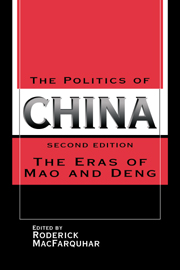Book contents
- Frontmatter
- Contents
- Preface
- List of tables and maps
- List of abbreviations
- Introduction
- 1 The establishment and consolidation of the new regime, 1949–57
- 2 The Great Leap Forward and the split in the Yan'an leadership, 1958–65
- 3 The Chinese state in crisis, 1966–9
- 4 The succession to Mao and the end of Maoism, 1969–82
- 5 The road to Tiananmen: Chinese politics in the 1980s
- 6 Reaction, resurgence, and succession: Chinese politics since Tiananmen
- Appendixes: Leaders and meetings
- References
- Index
6 - Reaction, resurgence, and succession: Chinese politics since Tiananmen
Published online by Cambridge University Press: 05 June 2012
- Frontmatter
- Contents
- Preface
- List of tables and maps
- List of abbreviations
- Introduction
- 1 The establishment and consolidation of the new regime, 1949–57
- 2 The Great Leap Forward and the split in the Yan'an leadership, 1958–65
- 3 The Chinese state in crisis, 1966–9
- 4 The succession to Mao and the end of Maoism, 1969–82
- 5 The road to Tiananmen: Chinese politics in the 1980s
- 6 Reaction, resurgence, and succession: Chinese politics since Tiananmen
- Appendixes: Leaders and meetings
- References
- Index
Summary
Tiananmen shook the Chinese Communist Party (CCP) to its core. The charge leveled against former general secretary Zhao Ziyang was that “[a]t the critical juncture involving the life and death of the Party and state, he made the mistake of supporting turmoil and splitting the Party, and he bears unshirkable responsibility for the formation and development of the turmoil. The nature and consequences of his mistakes are very serious.” The issues the Party faced, however, ran far deeper than even this charge suggested. Tiananmen threw open a whole series of questions that had been simmering just below the surface for years.
The most fundamental of these was the nature of reform itself. Tiananmen, many Party leaders believed, was the inevitable denouement of the reform program that Zhao led and symbolized; more important, the content of that reform program was inextricably intertwined with Zhao's patron, senior leader Deng Xiaoping. The question raised by Tiananmen, then, was the nature of Deng's leadership and thus whether or not the Party should continue reform as Deng had defined it. Many believed it should not.
The question of the content of reform, or, in Chinese jargon, the political line, was related to a number of state–society issues: the relations between the central government and the localities; the rapidly changing social structure of Chinese society, including the emergence of a middle class; the growing independence of the intellectual elite; the rising expectations of society; and the very real fears of many people that reform might hurt rather than help their interests.
- Type
- Chapter
- Information
- The Politics of ChinaThe Eras of Mao and Deng, pp. 472 - 532Publisher: Cambridge University PressPrint publication year: 1997
- 4
- Cited by



